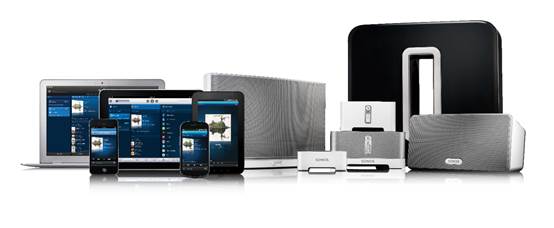Have you ever played air guitar to Guns ’n’
Roses’ “Sweet Child of Mine”? Or perhaps air drummed Phil Collins’ “In the Air
Tonight” like that infamous Cadbury gorilla? Better still, maybe you’ve used
the shampoo bottle in the shower as a microphone. My friend - I’m afraid you’ve
got the bug. The music bug that is! But don’t worry, all this means is that
you’ve got passion for music and we’ve got just the fix you need.
It wasn’t so long ago that multi-room audio
systems were the dreams of music listeners but attainable only by those with
deep pockets. Even today many audio companies demand a lot of your hard earned
money for such systems. Luckily there is one company that believes that
multi-room audio should be available to just about all music fans, even those
with relatively small budgets. Which company am I referring to? I’m glad you
asked. But first, let’s take a look at what’s involved in building a multi-room
audio system.

It
wasn’t so long ago that multi-room audio systems were the dreams of music
listeners but attainable only by those with deep pockets
What is a Multi-room Audio System?
The term ‘multi-room audio system’ refers
to a music system which allows you to listen to your entire music collection,
stored in one or more locations, in different rooms in your home. The different
rooms, also referred to as zones, can literally include every room in your home
and even spaces like your patio, balcony or garage. Multi-room audio systems
have been around for many years, in one form or another. So why haven’t they
become more popular with consumers over the years? In the past, multi-channel
audio components were expensive and required you to cut into the dry wall to
run wires. Not to mention the expensive, large and awkward remotes that had to
be programmed. Often times, setting up a multi-room audio system meant having
to hire a custom installer which further increased the price. But all of this
has been slowly changing over the last few years thanks to advancements in
digital, wireless, touchscreen and smartphone technologies. Together these
technologies have provided a backbone for the modem multi-room audio system,
while at the same time bringing the price down to a level that’s affordable to
the masses.
Introducing Sonos
Enter Sonos, a company that’s exclusively
in the multi-room audio business. Since Sonos launched its first products in
2005, the company has continued to redesign and refine its products to keep
them up to date with the latest market trends. The current Sonos family of
products consists of six components. There is the CONNECT module ($399), which
allows you to stream audio to any existing audio system; the CONNECT: AMP
($599), with built-in amplifiers, which lets you stream audio to any pair of
speakers; and the BRIDGE ($59) which connects to your internet router and uses
it to create a wireless Sonos network. There are also two all-in-one wireless
music systems, the PLAY:5 ($329) and PLAY:3 ($499), which feature built-in
amplifiers and speakers. Rounding out the line is the SUB, a wireless subwoofer
that retails for $749.

Introducing
Sonos
As you can see then, the Sonos components
are priced very reasonably. The other beautiful thing, which further reduces
the total cost of the system, is the fact that you can use any Apple or Andriod
smartphone or tablet to control the system. Just download the free Sonos
control app for your device. And who doesn’t already have one or two of these
devices at home? Sonos does offer its own dedicated touchscreen remote ($399),
although if you don’t already have an Apple or Android device you might as well
get one because it offers much more functionality than the Sonos remote. In
addition to all of this, the Sonos system can also be controlled by any PC or
Mac computer. So in the simplest form, a three room Sonos system can be set up
utilizing three PLAY: 3 all-in-one music systems plus the BRIDGE for just over
$1,000. That’s remarkable!
Features of the Sonos System
The Sonos system can be used to build an
incredibly flexible multi-room system, and you don’t have to decide how many
zones you’ll be setting up right at the beginning. You can always add new
components in the future - without affecting the rest of the system. Want to
start with 2 audio zones, that’s fine. Budget allows you to start with 4 zones?
That’s even better. The beauty of this system lies in the fact that you can mix
and match any of the Sonos components to create a multiroom system that suits
your specific needs. Take for example a two bedroom condo. You could set up two
all-in-one PLAY: 3 systems in each bedroom, a CONNECT: AMP in the kitchen with
two in-ceiling speakers, a CONNECT in the living room that connects to your
home theatre system and another CONNECT: AMP to run your outdoor speakers on
the balcony. Each of the components can play the same music or something
completely different. You can also adjust the volume of all the components at
once, or individually in each zone. Better still, all of the playback can be
controlled by your smartphone or tablet. How neat is that?
The Sonos system can be set up as a wired
or wireless system, or a mix of the two. Each of the components is capable of
streaming CD quality audio, 44 kHz/16-bit. High resolution audio playback is
not supported which is unfortunate but won’t impact most of the target
audience. To unlock the world of Sonos, one of the components needs to be
connected to your home network. Sonos says that its system will let you “stream
all the music on Earth” and while that’s a grand claim, it’s actually not far
from the truth. The Sonos system can play music from all the computers in your
home, or a Network Attached Storage (NAS) drive, and stream it wirelessly from
your smartphones and tablets. It can also play music from various online
services such as Songza, Last, fm, Rdio, Slacker and many more. Like Internet
radio? It does that too, offering access to over 100,000 free stations. It even
plays downloaded Podcasts. It’s not a stretch to say that it can play more
music than you can listen to in a lifetime. Check out the “Meet the Sonos
Family” box on the previous page for detailed info about each of the Sonos
components.
Setting Up the Sonos System - Is It
Really This Easy?

Setting
Up the Sonos System - Is It Really This Easy?
For the purpose of this article, I set up a
three zone Sonos system in my house, spanning my living/dining room, home
office and outdoor patio. If your network router sits in the electrical room in
the basement, like it does in my house, you’ll need to start by connecting the
BRIDGE there with an Ethernet cable. The remainder of the system can be set up
wired or wirelessly - I chose to go with the wireless option. Next, I set up
the CONNECT with my reference 2-channel music system (ModWright Instruments amp
and preamp, Bryston DAC, Focal speakers); the CONNECT: AMP in my home office
connected to Totem speakers; and another CONNECT: AMP in my kitchen which feeds
speakers on my patio. With all the components in place, I installed the free
Sonos control app on my iPhone, iPad and iPad mini. Finally, I let the app know
which and how many Sonos components are in my house -by pressing a button on
each component and a few screen taps on the app. And voila - I had a wireless
multi-room system set up and ready to play. It’s that simple.